While CPU, memory, OS and other variables don't often make a huge difference, there are some nonetheless. We have a computer that is used only for testing hardware. We do this so all tests can be compared reliably.
Test System:
| CPU: | AMD Athlon 64 X2 4600+ 2.4GHz | |
| Motherboard: | ASUS M2N-SLI Deluxe with BIOS 0304 | |
| Memory: | Corsair TWIN2X2048-6400 | |
| Video Card: | MSI NX7900GT-T2D256E - ForceWare v93.71 | |
| Hard Drive: | Seagate Barracuda 7200.10 SATA 3.0Gb/s 320GB | |
| Operating System: | Windows XP SP2 - NVIDIA nForce v9.16 |
For Blu-ray Disc writers, the performance tests are normally broken down into six sections: CD read, CD write, DVD read, DVD write, BD read and BD write. Each benchmark test has been run three times. The score given is an average of the three. DMA has been enabled in device manager for all IDE devices supporting it.
CD Read Tests: For the read performance section of the CD-ROM benchmarks, CD WinBench 99 v3.0 and CD Speed v4.7.5 are used to test read speeds, seek times and CPU usage. For DAE testing, CD Speed is used to give an overall speed rating.
CD Write Tests: To test the write speeds, Nero Burning Rom is used to write 650MB and 700MB to our test media. Times are recorded. To test rewrite scores, Nero is used again to time how long it takes to write 400MB of random files and directories. Then Sonic's DLA is used to test packet writing speeds. The same files are copied and pasted in Windows Explorer and timed.
DVD Read Tests: For the read performance section of the DVD benchmarks CD Speed v4.7.5 is used to test read speeds, seek times, and CPU usage.
DVD Write Tests: To test the DVD write speeds, Nero Burning Rom is used to write a 4.38GB image to our test media. Times are recorded. Then Sonic's DLA is used to test packet writing speeds. For this, 4GB of random files and directories are copied and pasted in Windows Explorer and timed.
BD Read Tests: For the read performance section of the BD benchmarks, CD Speed v4.7.5 is used to test read speeds, seek times, and CPU usage.
BD Write Tests: To test the BD write speeds, CD Speed's "Create Data Disc" feature is used to burn an entire BD-R/RE disc. Times are recorded.
CD Winbench 99 Scores:
| LG GGW-H10N |
Sony BWU-100A |
I-O DATA BRD-AM2B/U |
|
| CD Winbench 99 | 939 KB/sec | 1465 KB/sec | 1484 KB/sec |
| Transfer Rate: Inside | 2300 KB/sec | 2410 KB/sec | 2410 KB/sec |
| Transfer Rate: Outside | 4560 KB/sec | 4770 KB/sec | 4770 KB/sec |
| Random Access Time | 187ms | 132ms | 131ms |
| CPU Utilization | 0% | 0.41% | 0.32% |
The CD Winbench test is as close as we can get to testing every day usage. It fires off eight different applications using scripts. This tries to mimic the activities of a person loading these programs onto their own computer.
LG's Super Multi Blue drive gave us some mixed performance in our CD Winbench tests.In the transfer speed tests, the GGW-H10N started reading at 15.3x (2300 / 150) and reached a maximum speed of about 30.4x (4560 / 150) on the outside. While this is pretty good for a drive with a maximum read speed of 32x, its access time and overall score and access time were not as good as some of the other Blu-ray Disc writers we've looked at.
CD Speed v4.7.5 - Pressed CD:
For this test I used a pressed CD containing one Mode 1 data track. The disc is 74:38 in size and is full of data and directories.
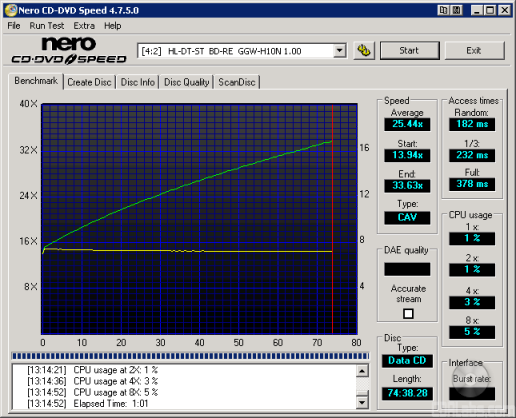
| LG GGW-H10N |
Sony BWU-100A |
I-O DATA BRD-AM2B/U |
|
| Transfer Speed Average: Start: End: |
25.44x 13.94x 33.63x |
24.89x 14.39x 32.83x |
24.85x 14.32x 32.85x |
| Seek Times Random: 1/3: Full: |
183ms 229ms 376ms |
137ms 145ms 273ms |
134ms 144ms 274ms |
| CPU Usage 1x: 2x: 4x: 8x: |
1% 1% 3% 5% |
0% 1% 3% 3% |
0% 1% 3% 4% |
LG's new drive performed a little better in our CD Speed tests. The GGW-H10N started reading at 13.94x and reached a maximum transfer speed of 33.63x. Unfortunately, its seek times were higher than we'd like to see.
CD Speed v4.7.5 - CD-R Media:
For this test I made a copy of our pressed test CD. I used 12x rated Memorex Gold 74 minute media for the tests.
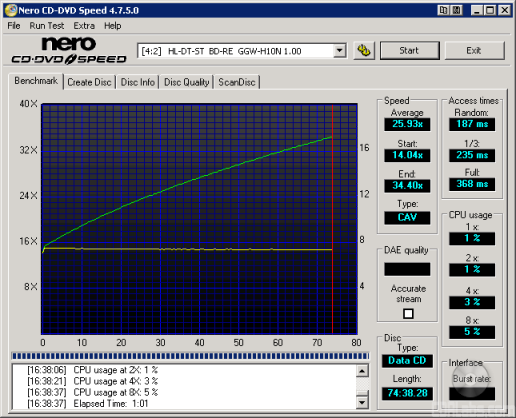
| LG GGW-H10N |
Sony BWU-100A |
I-O DATA BRD-AM2B/U |
|
| Transfer Speed Average: Start: End: |
25.93x 14.04x 34.40x |
25.17x 14.30x 33.29x |
24.75x 14.34x 32.67x |
| Seek Times Random: 1/3: Full: |
186ms 236ms 366ms |
148ms 160ms 242ms |
145ms 158ms 237ms |
| CPU Usage 1x: 2x: 4x: 8x: |
1% 1% 3% 5% |
0% 2% 3% 4% |
0% 2% 3% 4% |
The GGW-H10N was a little faster when reading CD-R media. Thanks to this small speed boost, the drive was able to reach a maximum transfer speed of more than 34x. Unfortunately, its seek times were again quite high.
LG's new Super Multi Blue drive had no problems recognizing our 99 minute CompUSA media. It read our test disc from start to finish, reaching a maximum transfer speed of 36.98x.
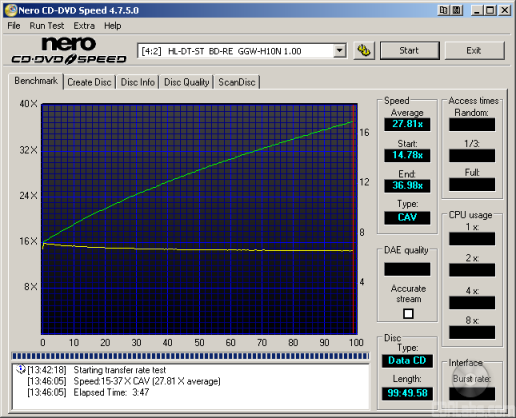
CD Speed v4.7.5 - CD-RW Media:
For this test I made a copy of a pressed test CD. I used some PNY 80 minute CD-RW media for the tests.
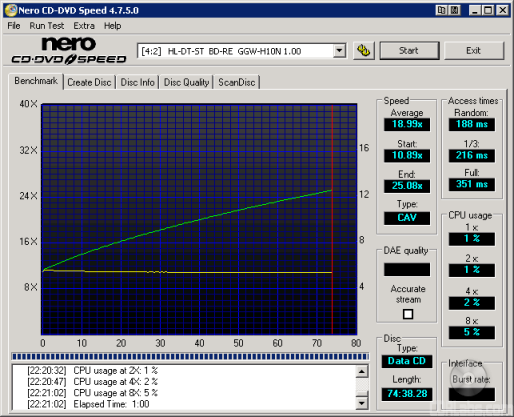
| LG GGW-H10N |
Sony BWU-100A |
I-O DATA BRD-AM2B/U |
|
| Transfer Speed Average: Start: End: |
18.99x 10.89x 25.08x |
18.54x 10.71x 24.43x |
18.61x 10.74x 24.57x |
| Seek Times Random: 1/3: Full: |
188ms 217ms 351ms |
152ms 162ms 244ms |
130ms 141ms 221ms |
| CPU Usage 1x: 2x: 4x: 8x: |
1% 1% 2% 5% |
0% 2% 3% 4% |
1% 2% 3% 4% |
Like the drives from Sony and I-O DATA, the GGW-H10N's CD-RW read speeds are limited to only 24x. As you can see, the drive had no problems reaching this speed in our tests.
CD DAE and CD Speed v4.7.5 - Pressed CD:
For this test I used Pure Funk. The CD is almost exactly 74 minutes. This helps to squeeze the maximum performance out of the CD.

Exact Audio Copy can tell us a lot about a drive's capabilities. You can see from the screen shot that while the LG GGW-H10N supports accurate stream and has the ability to retrieve C2 error information from the CD, it does not cache audio data.
| CD Speed | LG GGW-H10N |
Sony BWU-100A |
I-O DATA BRD-AM2B/U |
| Average: Start: End: DAE Quality: Accurate Stream: |
25.59x 14.04x 33.84x 10 Yes |
18.66x 10.98x 24.75x 10 Yes |
18.66x 10.96x 24.75x 10 Yes |
The GGW-H10N performed relatively well when ripping pressed audio CD's. With a maximum DAE speed of 33.84x, it had no problems taking the top spot in our tests.
CD DAE and CD Speed v4.7.5 - CD-R Media:
For this test I used a copy of the Pure Funk CD. It's burned onto the same Memorex Gold 74 minute media I used in the CD Speed tests.
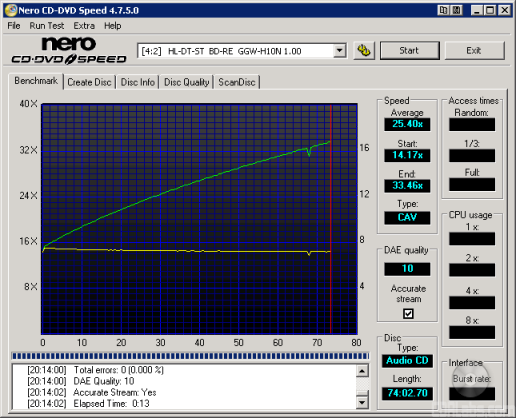
| CD Speed | LG GGW-H10N |
Sony BWU-100A |
I-O DATA BRD-AM2B/U |
| Average: Start: End: DAE Quality: Accurate Stream: |
25.40x 14.17x 33.46x 10 Yes |
18.46x 10.88x 24.31x 10 Yes |
18.48x 10.90x 24.31x 10 Yes |
While LG's new Super Multi Blue drive was a little slower when ripping audio CD-R discs, it had no problems reaching a maximum DAE speed of 33x in our tests. So how did it do in CD Speed's advanced DAE tests? Take a look below.
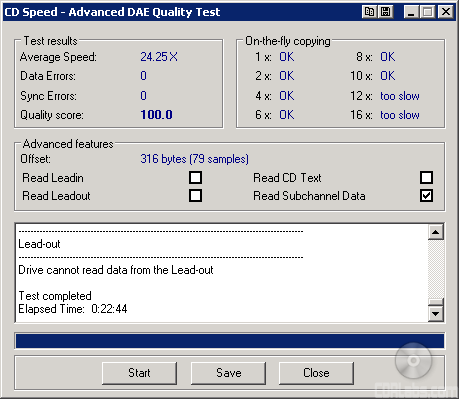
The GGW-H10N completed CD Speed's advanced DAE tests with an average score of 17.58x. While the drive was able to go through the tests without creating any errors, it was unable to pass all of the on the fly copying tests.If you look at the advanced features, you can see that the GGW-H10N was able to read the subchannel data but failed to read the CD-Text as well as the lead in and lead out sections of the CD.
To see how well LG's Super Multi Blue drive can read scratched and dirty discs, I used CD Speed's ScanDisc utility to see how many sectors were damaged or unreadable. This is a very rough, but good way to test the drive's error correcting abilities.
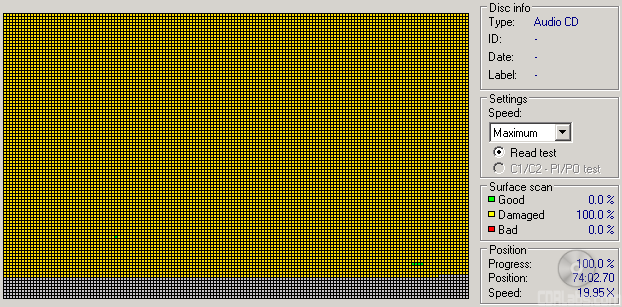
CD Speed - ScanDisc
The GGW-H10N seems to have some issues with CD Speed's ScanDisc utility. By looking at the screenshot, you can see that the drive considered 100% of the CD to be "damaged". I reran the test using a clean, unscratched CD and the results were the same.
You can also get an idea of how well the drive can read scratched and dirty discs by using CD DAE. CD DAE will extract the audio tracks twice and then compare them. From this information we can see what the drive's average speed was and how many errors it generated.
| CD DAE | Avg. Speed | Errors | % of Disc |
| LG GGW-H10N | 14.3x | 2327759 | 0.30% |
| Sony BWU-100A | 17.6x | 66749492 | 8.51% |
| I-O DATA BRD-AM2B/U | 1.6x | 2446960 | 0.31% |
The GGW-H10N gave some mixed results in this test. While it had the lowest number of errors, the scratches on the disc caused it to slow down considerably.

